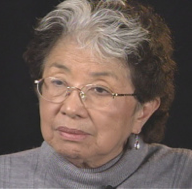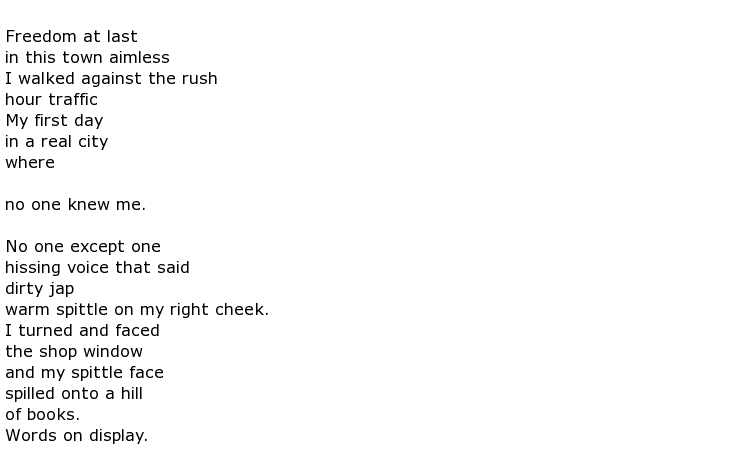 Mitsuye Yamada is a Japanese/American writer now in her nineties who spent many years as a English professor in California. She has been a keen activist during her lifetime, having had the misfortune to be incarcerated during the Second World War when all those thought a threat to the US government were rounded up and put into camps. She wrote extensively about this experience.
Mitsuye Yamada is a Japanese/American writer now in her nineties who spent many years as a English professor in California. She has been a keen activist during her lifetime, having had the misfortune to be incarcerated during the Second World War when all those thought a threat to the US government were rounded up and put into camps. She wrote extensively about this experience.
She was born Mitsuye Yasutake on the 5th July 1923 in Fukuoka. Her mother and father were only visiting Japan at the time, being 1st generation Japanese Americans, known as Issei. The family settled in Seattle when they returned to the US in 1926. Despite working for the government as an interpreter and immigration service official, her father was taken under arrest as a suspected spy in 1942. The rest of the family were then interned at the Minidoka center and Mitsuye was so affected by this experience that she documented her time there. The findings were later published under the title

She renounced her loyalty to Japan and was released in 1944, immediately enrolling at the Cincinnati University. After a year she moved on to NYU, graduating from there with a BA in English in 1947. Mitsuye obtained her Masters’ degree in 1953 at the Chicago University. By this time she had met and married a man called Yoshikazu and they had four children. Mitsuye then took out US citizenship in 1955 and began to think of herself as Nisei – a second-generation Japanese American.
Yamada’s stories of life in the camp were not published until 1976 and were a painful, often angry, account of the “invisible racism” suffered by American-Japanese people both whilst in the war and afterwards. It had always been traditional for Asian women to remain silent on such issues and her aim in publishing the book was to give them a voice where, perhaps, none existed before. She was quoted as saying that:

Camp Notes documented the move from Seattle to their prison camp and then life afterwards when she moved to Cincinnati. Her poem of the same name illustrates the bigotry that her people had to suffer while walking the streets of the city. Many freed internees suffered racial violence before they were finally allowed to re-integrate into American society. Here is the poem:

It was a powerful book that reminded those ignorant of the humiliation and discrimination that internees had suffered during the war, and in the years following. She campaigned tirelessly on behalf of Asian-American women, and indeed all women of colour, encouraging them to assert their rights in society. In 1981 she went on television with another female poet called Nellie Wong to present a documentary called

It told the story of the struggles of their parents and grand-parents in their attempts to establish themselves in new cultures.
In recent years Yamada has revisited the camp experiences in a book called

It re-emphasised the terrible times that women, in particular, suffered at that time. There were many accounts of domestic and sexual violence and she felt it necessary to remind everyone of the unwarranted and traumatic gender discrimination that women have suffered through the generations.

